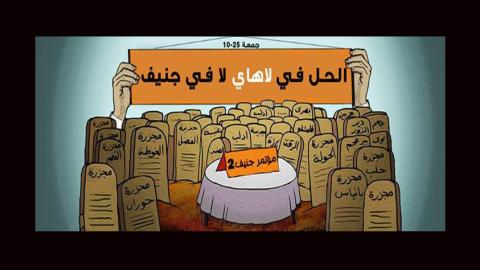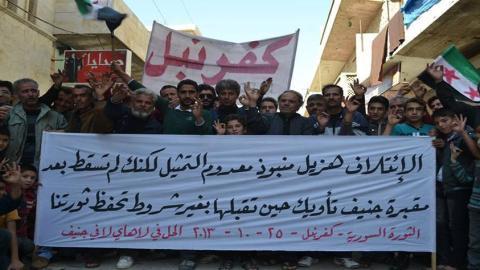Will it be held? Will the Syrian National Coalition attend the conference? Will it call for Assad’s departure? Will violence stop after the conference? What about accountability of those responsible for the bloodshed? These are but a few of the many questions on Syrians’ minds.
The plurality of opinions and answers to each of these questions, among others, makes classifying and recognizing the different blocks and groups much harder, even within both the opposition and Assad-loyalist camps.
The Political Opposition
The question of attendance is especially divisive within the opposition. While more moderate groups based inside Syria (National Coordination Committee and Building the Syrian State) have agreed to attend, exiled hardline groups, namely the Syrian National Council, have strongly objected to the conference. The council even threatened to withdraw from the larger opposition umbrella group, Syrian National Coalition, if it decides to take part in the gathering. The coalition itself is rocked by sharp differences between its members.
After early signs that it would accede to the talks, most of the militant groups under its authority, who are largely loyal to other regional powers with differing interests, announced that they were withdrawing from the coalition. An ominous sign that even with a relatively successful outcome, the violence might not stop after the conference. Haytham Manna, the head of the National Coordination Committee in exile, pointed this out in a recent interview with al-Mayadin TV station: “Violence will only increase with Geneva 2, because those who refuse the political track will express their refusal with more violence.”
Moreover, those in the opposition who supported a military solution have been the harshest critics of the conference. They see the conference as failing to deliver their most important demand: that Assad must leave before any negotiations could start. What complicates matters further is that those who reject Geneva 2 offer no other alternative for a solution but military victory. However, this is also a slippery road given the dwindling support for opposition military groups.
Amongst the supporters of the National Coordination Committee and Building the Syrian State, which is the closest representation of the political center in Syria (or the so-called the “silent bloc”), there is general agreement on participation in the conference. Nevertheless, they voice reservations on the conditions of the proposed negotiations. Particularly worrisome is that there is no guarantee that the president’s powers will be passed on to the transitional government.
Rim Turkmani, a member of the Building the Syrian State group, reflected their commitment to the political process: “A political track is the only way to save the country and the people at the moment. When military victory is no longer an option, we have to resort to the political process.” But Turkmani also voiced out some concerns about the power-sharing outcomes of the conference: “Nevertheless, the powers of the presidency must be part of the negotiation process. Even if we can’t move these powers completely to the transitional government, we must insist on guarantees for effective participation in the decision making process as a first step to ending tyranny.”
Many people, however, believe that Turkmani’s position shows a distinct lack of appreciation of the regime’s complex structures. They point out that effective power in the country is limited to the three cabinets of defense, interior and foreign affairs, which the regime will insist on retaining in any negotiations. This, in effect, turns Geneva 2 into a rubber stamp for renewed legitimacy for the regime, rather than anything else.
The Civil Opposition
On the Syrian street, there is a tendency to reject this conference, which complicates matters further for the political forces. Many of those who opposed the regime from the beginning regard participation in Geneva 2 as political suicide.
This rejection is voiced through street demonstrations and on online pages that completely reject the conference in its current format. One Facebook page aiming to boycott the conference published a cartoon juxtaposing a dialogue table surrounded by graves from the regime’s massacres, under the title: “The solution is in The Hague, not Geneva.” This puts the politicians in front of a difficult choice: either to refuse to attend the conference and be responsible for its failure, or attend and face the wrath of their supporters.

This sign from Kafranbel makes the case against Geneva 2 brutally clear when it warns the coalition that attendance amounts to political suicide: “The coalition is already frail and lacking in representation, but it has not yet fallen. Going to Geneva without obtaining guarantees for our revolution will be its final grave.”
The more moderate supporters of the National Coordination Committee have also voiced their concerns that their organization seems to have dropped its demands for freeing its detainees (Abdulaziz Khayer, Iyas Ayash, Maher Tahan) as a condition for participating in the Geneva 2 conference. Maher Tahan’s wife, Yara Fares, protested on the matter saying: “Going to Geneva 2 before all detainees are free is nothing but betrayal.” Fadwa Mohammad, Tahan’s mother, wrote to politicians from the committee saying: “Khayer, Tahan, Ayash… don’t these detainees deserve from you a moment’s pause to demand their freedom before going to Geneva?”

The Loyalists and the Silent Bloc
The regime has officially voiced its support for the conference. For them, the conference comes as service to their cause. On the one hand the conference doesn’t discuss the question of Assad’s departure, and keeps the door open for him to run in the 2014 presidential elections, as well as his active participation in the transitional period. This was vaguely hinted at by Lakhdar Brahimi, the international envoy to Syria. On the other hand, the regime feels more comfortable at the moment with the American-Russian proximity, the recent military successes on the ground, the divisions between the opposition groups and the clashes between the Free Syrian Army (FSA) and radical islamist groups like the Islamic State of Iraq and Syria (ISIS) and al-Nusra Front.
The mood on the loyalist street feels like a carbon copy of the government’s press releases. Most of the answers given to Syria Untold about participation in the Geneva 2 conference were ambiguous and unclear: “We are with Assad and against any negotiations with terrorists. But we support the Geneva conference if it means Assad can stay forever.” The silent bloc however, seems resigned to accepting any solution that could end the war and bring back peace. They are less than enthusiastic about the idea of Assad staying in power, but they seem to accept that “poison” as the price for the return to normal life.



